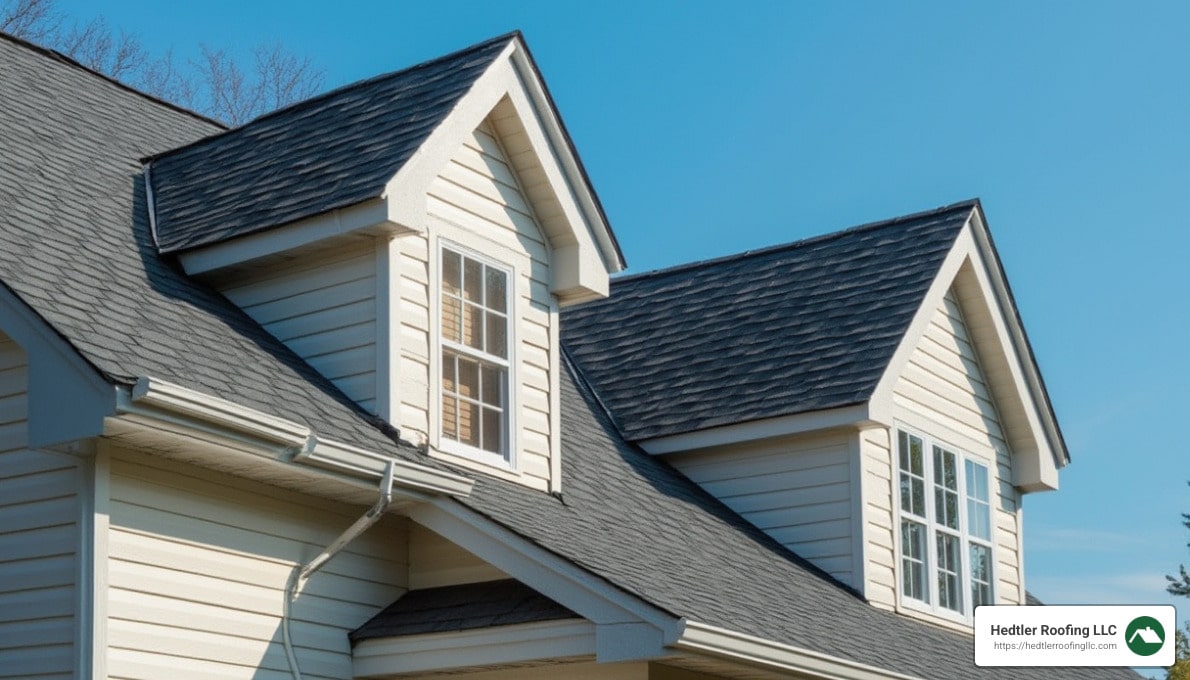Roof Inspection: Top 5 Crucial Steps 2025
How often do you get a roof inspection is a common question among Massachusetts homeowners who prioritize the safety and longevity of their homes. To help you stay ahead of potential issues, consider the following general guidelines:
- Inspect your roof twice a year—ideally in the spring and fall.
- After severe weather events, such as hailstorms or hurricanes, another inspection is advisable.
- Older roofs, particularly those over 20 years old, may require annual inspections or more frequent checks.
A well-maintained roof isn’t just a barrier against inclement weather—it’s a vital part of your home’s structural integrity. Regular roof inspections can help catch small problems before they become costly repairs, ensuring that your roof continues to provide protection and peace of mind for years to come.
I’m Jason Hedtler, owner of Roof Experts, where I’ve dedicated my career to understanding how often do you get a roof inspection is necessary to maintain durable and aesthetically pleasing roofs for our Massachusetts community. With my extensive experience, I’m here to guide you through making informed decisions about your roofing needs.

How often roof inspection terms explained:
– roof inspection checklist
– roof inspection for insurance
– certified roof inspectors
Why Regular Roof Inspections Matter
Regular roof inspections are crucial for several reasons. They help in damage prevention, meet insurance requirements, and allow for early detection of potential issues.
Damage Prevention
Your roof faces constant exposure to the elements. Over time, sun, wind, and rain can cause significant wear and tear. Regular inspections help catch these small issues before they escalate. For example, clogged gutters might seem minor but can lead to water damage affecting your roof deck and even the interior of your home. By addressing these minor repairs early, you can save on costly replacements down the line.
Insurance Requirements
Many insurance policies require regular roof inspections to maintain coverage. If you skip these inspections, you might risk your coverage in the event of damage from storms or other disasters. A professional inspection provides detailed documentation that can be crucial when filing a claim.

Early Detection
Early detection is the key to cost savings. A small leak might only require a simple patch, but if left unchecked, it can cause significant water damage. This includes rotting wood, mold growth, and damaged insulation. A case study from Bellingham, MA, highlighted how a minor leak around a skylight was caught early, resulting in minimal repair costs. Ignoring it could have led to thousands of dollars in structural repairs.
Regular inspections not only protect your home but also your wallet. By investing in preventative maintenance and early detection, you avoid major repairs and ensure your insurance coverage is effective.
How Often Roof Inspection is Necessary
Determining how often roof inspection is necessary depends on several factors. These include the age of your roof, the type of materials used, and the weather conditions in your area.
Factors Influencing Inspection Frequency
1. Age of the Roof
The age of your roof is a significant factor. Newer roofs typically require less frequent inspections, while older roofs (over 10 years old) benefit from more regular checks. As roofs age, they become more susceptible to wear and tear. For roofs older than 20 years, annual inspections are highly recommended to catch potential problems early.
2. Material Type
Different roofing materials have different durability levels. Asphalt shingles, for example, might need more frequent inspections compared to metal or tile roofs. Each material reacts differently to weather conditions, so understanding your roof’s material can help tailor the inspection schedule.
3. Weather Conditions
Local weather plays a crucial role in determining inspection frequency. In Massachusetts, where Roof Experts operates, the climate can be harsh with cold winters and occasional heavy snowfall. These conditions can stress your roof significantly. After severe weather, such as storms or heavy snowfalls, it’s wise to schedule an inspection to assess any potential damage.
Recommended Inspection Schedule
Based on these factors, here’s a simple recommended schedule:
- Twice a Year: Ideally, schedule inspections in the spring and fall. A spring inspection helps identify damage from winter, while a fall inspection ensures your roof is ready for the cold months ahead.
- After Severe Weather: Always inspect your roof after severe weather events. High winds, hail, or heavy snow can cause damage that isn’t immediately visible but can lead to bigger problems if not addressed.
- Annual Check for Older Roofs: If your roof is over 10 years old, consider an annual inspection. This helps catch minor issues before they develop into costly repairs.
Regular roof inspections are key to maintaining the health and longevity of your roof. By considering factors like age, material, and local weather, you can ensure your roof stays in top condition year-round.
What Happens During a Roof Inspection
When you schedule a roof inspection, a professional will thoroughly assess your roof’s condition. This involves checking for damage, wear, and potential problem areas. Here’s a breakdown of what typically happens:
Inspection Process
- Visual Examination: The inspector will start with a visual check from the ground. They’ll look for obvious issues like missing shingles or sagging areas.
- Climbing Up: Next, they will climb onto the roof to examine it up close. This includes looking at shingles, flashing, and other roof components.
- Interior Check: Sometimes, an interior inspection is necessary. The inspector might check your attic for signs of leaks or water damage, like wet insulation.
- Documentation: Throughout the inspection, the professional will take notes and photos. This helps in creating a detailed report of the roof’s condition.
Common Issues Identified
During the inspection, several common issues might be identified:
- Flashing Problems: Flashing seals joints and edges on your roof. If it’s rusty or missing, water can seep in and cause damage.
- Debris Accumulation: Leaves or branches can pile up, blocking drainage and causing water to pool on your roof.
Post-Inspection Actions
After the inspection, you’ll receive a report detailing any issues found. Here’s what happens next:
- Repair Recommendations: The inspector will suggest necessary repairs. For example, they might recommend replacing damaged shingles or fixing faulty flashing.
- Cost Estimates: You’ll receive an estimate for the recommended repairs. This helps you plan financially.
- Lifespan Assessment: The inspector will estimate how long your roof is likely to last. This can guide decisions about future maintenance or replacement.
Regular inspections and timely repairs help extend your roof’s lifespan, saving you money in the long run. By addressing issues early, you prevent minor problems from turning into major headaches.
Frequently Asked Questions about Roof Inspections
How do you know if your roof is damaged?
Spotting roof damage early can save you a lot of trouble. Here are a few signs to look for:
- Water Spots: If you notice water stains on your ceilings or walls, it might be a sign of a leaky roof. These leaks often start small but can lead to significant damage if ignored.
- Missing Shingles: Shingles protect your roof from the elements. If you see gaps where shingles should be, your roof is vulnerable to water damage. This can lead to mold, rot, and even structural issues.
- Damaged Flashing: Flashing is the material that seals joints and edges on your roof, like around chimneys or skylights. If flashing is rusty, corroded, or missing, water can seep in and cause damage.

How often should you clean your roof?
Regular cleaning is key to maintaining your roof’s health:
- Annual Cleaning: Aim to clean your roof at least once a year. This helps remove debris that can trap moisture and cause damage.
- Moss and Algae Prevention: In areas with high humidity or shade, moss and algae can grow on your roof. These can cause shingles to deteriorate faster. Consider using moss and algae-resistant treatments to prevent growth.
How often should you have your roof inspected in Florida?
While Roof Experts only services Massachusetts, understanding inspection needs in different climates can be helpful:
- Twice a Year: In Florida, it’s wise to inspect your roof twice a year. The state’s humid climate and frequent storms can cause rapid wear and tear.
- After Severe Weather: After hurricanes or major storms, check your roof for damage. Even if it looks fine from the ground, hidden issues could be lurking. A quick post-storm inspection can catch problems before they grow.
Conclusion: How Often Do You Get a Roof Inspection
At Roof Experts, we understand that your home is your most valuable asset. For homeowners in Massachusetts, maintaining the integrity of your roof is crucial. Regular professional inspections are an essential part of this maintenance.
Our team, based in Bellingham, MA, is dedicated to providing high-quality workmanship and exceptional customer service. With over 20 years of experience, we specialize in roof installations, replacements, and repairs. We serve a wide range of areas, including Plymouth, Middleborough, Bridgewater, and more.
Why choose professional inspections?
- Expertise: Our professionals have the experience to spot issues that might be missed during a DIY inspection. This expertise ensures that potential problems are addressed early, saving you time and money in the long run.
- Comprehensive Assessments: We provide detailed reports that are essential for planning repairs and for insurance purposes. This thorough approach gives you peace of mind, knowing your roof is in capable hands.
- Local Understanding: As Massachusetts locals, we understand the unique weather conditions that can affect your roof. From harsh winters to humid summers, our team knows how to tailor inspections and maintenance to meet these challenges.
Regular inspections are a proactive way to protect your home from costly damage. Schedule your roof inspection with Roof Experts today and ensure your roof remains in peak condition for years to come.
Learn more about our services and book an inspection. Your home deserves the best care, and we’re here to provide it.


